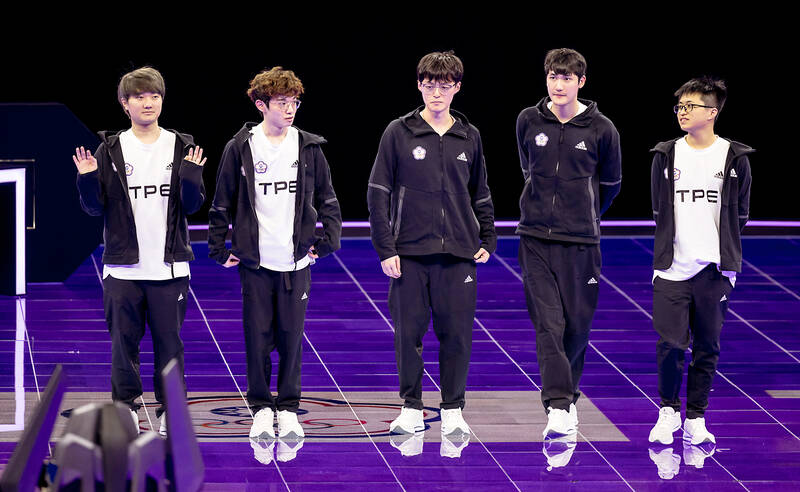Their language was salty and the message was clear: game developers believed their livelihoods were under threat and they were not going to accept it.
Unity, a US company whose software is used to create and run thousands of games including smash hits like “Pokemon GO” and “Genshin Impact,” announced on Sept. 12 new fees for developers.
The firm was going to charge 20 cents every time a Unity-backed game was installed on any device, a move that analysts warned could collapse studios and nix new releases.

Photo: EPA-EFE
Ten days later, after a spirited and often vulgarity-laden fightback from studios and developers, Unity rowed back some of the changes.
But for many developers, the damage may be irreparable.
“If I’m forced to accept the current conditions, I will leave,” said Alain Puget, director of the French studio Alkemi.

Photo: AFP
Unity claims that its technology underpins 70 percent of the top 1,000 mobile games, and that people download apps made with its software four billion times a month.
Levying even a tiny fee would reap it big rewards.
But there are plenty of alternative “engines,” as the software is known.

Photo: AFP
“Game makers have already begun to consider switching engines,” said Rhys Elliott, market analyst at the Newzoo consultancy.
‘DISCONNECTED FROM REALITY’
It was all very different back in 2005, when Unity launched with promises of democratizing game development. Its software platform was cheap and easy to use, and quickly became a favorite for independent and smaller developers.
The main innovation was that designers could build on elements from other games, such as the lighting of a background or the movements of characters.
Before Unity and its competitors emerged, each game was custom made, with graphics and everything else built from the ground up.
After a stellar rise, the firm went public in 2020.
For many industry watchers, the stock market flotation was the start of the fall.
The firm, which projects revenues of US$2 billion this year, has instituted several waves of layoffs and alienated users by tweaking the software and pricing.
Then came the Sept. 12 bombshell.
“The first proposal they made was completely disconnected from reality,” said Puget of Alkemi.
Hundreds of developers took to social media to slam a proposal they said would kill studios relying on free-to-download games and any smaller outfits that happened to develop a hit game.
“There is no way Unity talked to a single developer before launching this,” developer and consultant Rami Ismail posted on X, formerly Twitter.
The firm returned with an apology — “we heard your concerns,” “you are what makes Unity great” — and a new offer to limit the levy to the most successful games.
Puget believes the firm made a “totally unreasonable” initial proposal so that their later offer, which will still give them a huge windfall, seems more palatable.
‘STOP IT’
The vitriol from developers suggests Unity has a long way to go before it is accepted back into the fold.
Shortly after the initial announcement, an account sprang up on X to collate the responses under the handle “fucked by Unity,” gaining more than 15,000 followers in a few days.
While some developers issued heartfelt letters, others resorted to images of raised middle fingers in front of the Unity logo, or short messages with obscenities of discontent.
“Stop it. WTF?” was the stark response from Innersloth, whose game “Among Us,” made with Unity software, has an estimated 500 million players.
Puget said he was unsure if there was a way back for Unity, saying that “like everyone else” he would look at alternatives.
“It makes me sad to think that I’ve invested 13 years of learning, of research and development, in a solution that I’ll have to throw away,” he said.

April 14 to April 20 In March 1947, Sising Katadrepan urged the government to drop the “high mountain people” (高山族) designation for Indigenous Taiwanese and refer to them as “Taiwan people” (台灣族). He considered the term derogatory, arguing that it made them sound like animals. The Taiwan Provincial Government agreed to stop using the term, stating that Indigenous Taiwanese suffered all sorts of discrimination and oppression under the Japanese and were forced to live in the mountains as outsiders to society. Now, under the new regime, they would be seen as equals, thus they should be henceforth

Last week, the the National Immigration Agency (NIA) told the legislature that more than 10,000 naturalized Taiwanese citizens from the People’s Republic of China (PRC) risked having their citizenship revoked if they failed to provide proof that they had renounced their Chinese household registration within the next three months. Renunciation is required under the Act Governing Relations Between the People of the Taiwan Area and the Mainland Area (臺灣地區與大陸地區人民關係條例), as amended in 2004, though it was only a legal requirement after 2000. Prior to that, it had been only an administrative requirement since the Nationality Act (國籍法) was established in

Three big changes have transformed the landscape of Taiwan’s local patronage factions: Increasing Democratic Progressive Party (DPP) involvement, rising new factions and the Chinese Nationalist Party’s (KMT) significantly weakened control. GREEN FACTIONS It is said that “south of the Zhuoshui River (濁水溪), there is no blue-green divide,” meaning that from Yunlin County south there is no difference between KMT and DPP politicians. This is not always true, but there is more than a grain of truth to it. Traditionally, DPP factions are viewed as national entities, with their primary function to secure plum positions in the party and government. This is not unusual

The other day, a friend decided to playfully name our individual roles within the group: planner, emotional support, and so on. I was the fault-finder — or, as she put it, “the grumpy teenager” — who points out problems, but doesn’t suggest alternatives. She was only kidding around, but she struck at an insecurity I have: that I’m unacceptably, intolerably negative. My first instinct is to stress-test ideas for potential flaws. This critical tendency serves me well professionally, and feels true to who I am. If I don’t enjoy a film, for example, I don’t swallow my opinion. But I sometimes worry